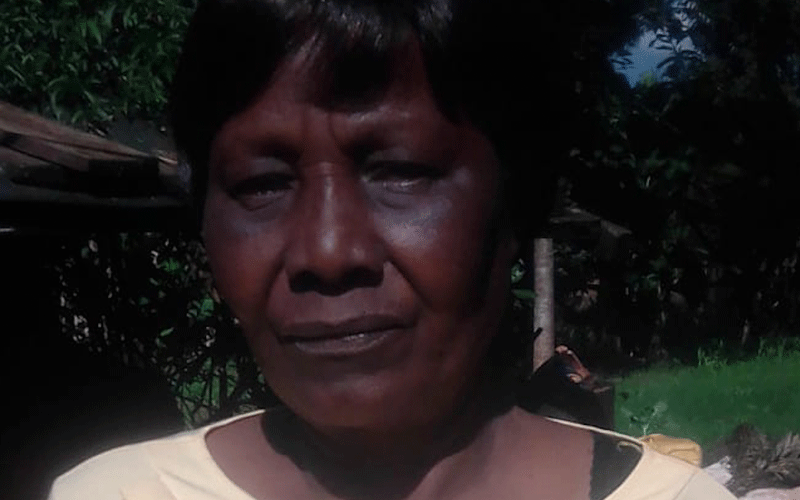Kabuga arrest rekindles hope for family of slain journalist
By People Team, May 18, 2020Roy Lumbe and Zadock Angira
For the family of slain journalist William Munuhe, the 17-year wait to see his suspected killer arrested and prosecuted has brought mixed feelings of hope and betrayal.
After seeking justice at the courts, the family sued the government for refusing to set up public inquest to establish the cause of Munuhe’s death after initial reports pointed that he had committed suicide.
With Munuhe’s murder widely linked to Rwandan fugitive Felicien Kabuga, his arrest in France on Saturday has rekindled hope of getting justice.
For Munuhe’s mother Lydia Wangui, 68, who resides in Nyeri, nothing can assuage the pain of losing her son.
She says since the death of her son, she has been praying for justice, adding that Kabuga’s arrest could bring closure to a dark chapter of their lives.
She said they would be following closely on the case.
“No mother wishes to bury their children, it was hard but with God’s grace I am alive to see the suspect who reportedly claimed my son’s life arrested,” she added.
Wangui wants the government to protect all witnesses listed in the cases against the fugitive saying no life should be lost again.
Bullet wound
Josephat Muriithi said the murder of his younger brother was a huge blow to the family adding that the last wishes of his father on his deathbed in 2018 was for him to find justice for his brother.
“Our father died with a heavy heart at times he would call us and say the killer would be apprehended before he died. I think this was one of the things that contributed to his death,” said Muriithi.
He says despite Kabuga’s arrest bringing a ray of hope, it had forced them to relieve the pain of losing their kin.
Munuhe died on January 14, 2003 at his home in Karen, Nairobi. Police found Munuhe’s body covered with the blanket with a bullet wound in his head.
Muriithi said after moving from one government office to another in a frustrating search for justice for his brother, they were forced to seek international help.
After writing to the International Criminal Court informing it of the murder and linking it to Kabuga, Muriithi said he got an immediate response informing him that a file had been opened.
“I was told once the fugitive was captured and new evidence was provided, then the court would follow up the matter. Now I have hope he will face the full force of the law,” said Muriithi.
According to investigations, Munuhe was murdered on the same day he had arranged to host Kabuga at his house and to set him up for arrest with the US Federal Bureau of Investigation (FBI).
In a suit filed at the High Court in Nakuru, the family has accused the State and its agencies of failing to conclude investigations into the murder to bring the matter to closure.
Fake names
They have sued the Principal Secretary Ministry of Interior, Inspector General of Police, the Directorate of Criminal Investigations, the Director of Public Prosecutions, Principal Civil Registrar Immigration and legal advisors of government who have been listed as defendants.
Kabuga has been on the world’s most-wanted list for his role in the 1994 Rwandan genocide against the Tutsis that saw more than 800,000 people killed.
His arrest on Saturday whittles down the list of men wanted by the International Criminal Tribunal for Rwanda (ICTR) in connection with the 1994 Rwandan genocide.
Of the 90 people indicted by the ICTR, seven remain at large. Kabuga, Mpiranya and Bizimana have been earmarked for trial by the Mechanism.
The ICTR Prosecutor has requested referrals to Rwanda in the cases of the five other fugitives: Fulgence Kayishema, Charles Sikubwabo, Aloys Ndimbati, Ryandikayo, and Phénéas Munyarugarama.
Kabuga had been indicted by the ICTR on seven counts, including genocide, conspiracy to commit genocide, persecution and extermination.
Kabuga was born in 1935 in Muniga, Rwanda and detectives say he has been using several fake names including Idris Sudi, Abachref Straton, Anathase Munyarunga and Oliver Kabuga.
He made several escapes in the past. On July 19, 1997, he escaped a joint police raid where seven other Rwandan genocide suspects were arrested in an operation code named “Operation NA-KI” (Nairobi-Kigali).
The Interpol Secretary General Jürgen Stock praised the arrest as an important step in bringing justice for the victims and survivors of the Rwandan genocide.
“Kabuga’s arrest demonstrates the power and effectiveness of international cooperation between police worldwide in identifying, locating and apprehending fugitives around the world.”
